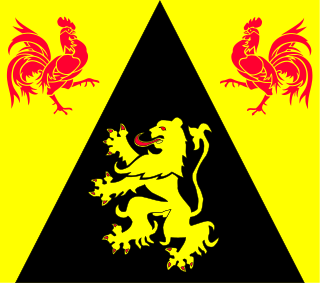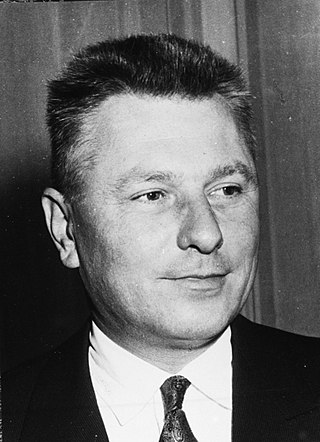See also
- Brussels Enterprises Commerce and Industry
- VOKA
- Economy of Belgium
- Science and technology in Wallonia
- Agoria
- UNIZO
- Cercle de Lorraine
- Prince Albert Fund
The Walloon Union of Companies or Union Wallonne des Entreprises (UWE) is the Walloon employers organization.
About 1965, when economic decentralization was becoming more pronounced in Belgium, Walloon business leaders felt the need for more organisation. The pioneers of the UWE, were, to name a few, Jules Delruelle (Prayon), George Halbart (Magotteaux), George Henry (Glaverbel), Pierre Holoffe (Asphaltco), Leon Jacques (Carrières de Quenast) Jean Lannoye (Papeteries de Genval), Jules Plaquet (Compagnie des Ciments Belges), Alfred Putzeys (Pieux Franki).
Together they decided, at the end of 1967, to invite a hundred company managers to a meeting, the result of which was to create the Walloon Union of Companies (rather than the Union of Walloon Companies), in this way allowing the many foreign companies established in the Walloon Area to join the organization. It is also decided to open the organization to both the industrial and non-industrial sectors. The FEB (Federation of the Companies of Belgium) had not been established at that point and the national organization was based on a Federation of the Industrialists of Belgium and a Federation of the non-industrial companies of Belgium.
Following this first meeting, it was decided to set up a Board of Directors and gather some initial funding. The new organization was founded on 2 April 1968. The first general meeting, in 1969, took place at the Charleroi Institute of Glass.

Walloons are a Gallo-Romance ethnic group native to Wallonia and the immediate adjacent regions of France, Germany, Luxembourg and the Netherlands. Walloons primarily speak langues d'oïl such as Belgian French, Picard and Walloon. Walloons are historically and primarily Roman Catholic.

Walloon Brabant is a province located in Belgium's French-speaking region of Wallonia. It borders on the province of Flemish Brabant and the provinces of Liège, Namur and Hainaut. Walloon Brabant's capital and largest city is Wavre.

Wallonia, officially the Walloon Region, is one of the three regions of Belgium—along with Flanders and Brussels. Covering the southern portion of the country, Wallonia is primarily French-speaking. It accounts for 55% of Belgium's territory, but only a third of its population. The Walloon Region and the French Community of Belgium, which is the political entity responsible for matters related mainly to culture and education, are independent concepts, because the French Community of Belgium encompasses both Wallonia and the bilingual Brussels-Capital Region.
Walloon is a Romance language that is spoken in much of Wallonia and in Brussels, Belgium; some villages near Givet, northern France; and a clutch of communities in northeastern Wisconsin, U.S. It belongs to the langues d'oïl language family, the most prominent member of which is French. The historical background of its formation was the territorial extension since 980 of the Principality of Liège to the south and west. Walloon is classified as "definitely endangered" by the UNESCO Atlas of the World's Languages in Danger.

"The Song of the Walloons" is the regional anthem of Wallonia in Belgium. The original lyrics were written by Théophile Bovy in 1900 in the Walloon language. A year later, it was set to music composed by Louis Hillier. Performed for the first time in the city of Liège, the song quickly spread to other parts of French-speaking Belgium and established itself like a "national" anthem for Wallonia.

Agoria, previously known as Fabrimetal, is a Belgian employers' organization and member of the Federation of Belgian Enterprises.
The Federation of Enterprises in Belgium is the only Belgian non-profit organization representing companies in all three regions of Belgium. Its members, the different Belgian sectorial employers' organizations, represent companies in key industrial and service sectors. All in all, it represents more than 30,000 businesses, of which 25,000 are small or medium-sized enterprises. Since May 2012, Pieter Timmermans is CEO of the Federation of Belgian Enterprises, and since March 2017, Bernard Gilliot of Tractebel is the President.

Jules Destrée was a Walloon lawyer, cultural critic and socialist politician. The trials subsequent to the strikes of 1886 determined his commitment within the Belgian Labour Party. He wrote a Letter to the King in 1912, which is seen as the founding declaration of the Walloon movement. He is famous for his quote "Il n'y a pas de Belges", pointing to the lack of patriotic feelings in Flemings and Walloons, while pleading for some kind of federal state.
The Cercle de Lorraine or Club van Lotharingen is a Belgian business club, located in Brussels, Belgium. The club was founded in 1998, and it wants to bring together, distinguished and representative personalities from the Belgian financial community, French speaking as well as Dutch speaking, who are united within an honorary committee.

Aimée Bologne-Lemaire was a Belgian feminist, member of the resistance, and Walloon activist.
The Walloon Movement is an umbrella term for all Belgium political movements that either assert the existence of a Walloon identity and of Wallonia and/or defend French culture and language within Belgium, either within the framework of the 1830 Deal or either defending the linguistic rights of French-speakers. The movement began as a defence of the primacy of French but later gained political and socio-economic objectives. In French, the terms wallingantisme and wallingants are also used to describe, sometimes pejoratively, the movement and its activists. To a lesser extent, the Walloon Movement is also associated with the representation of the small German-speaking population in the East Belgium of the Walloon Region.
The Walloon Movement traces its ancestry to 1856 when literary and folkloric movements based around the Society of Walloon language and literature began forming. Despite the formation of the Society of Walloon Literature, it was not until around 1880 that a "Walloon and French-speaking defense movement" appeared, following the linguistic laws of the 1870s. The movement asserted the existence of Wallonia and a Walloon identity while maintaining the defense of the French language.
The Walloon SME finance and guarantee company was founded by the Walloon Region in 2002 to provide capital to the Walloon Small and medium enterprises (SMEs). The purpose of the SOWALFIN is to invest in the equity of unlisted companies. The SRIW acts either by purchasing shares of SMEs, by increasing the capital of the business, by subscribing to a bond issue, or by granting subordinated or convertible loans.
The history of Wallonia, from prehistoric times to the present day, is that of a territory which, since 1970, has approximately coincided with the territory of Wallonia, a federated component of Belgium, which also includes the smaller German-speaking Community of Belgium. Wallonia is the name colloquially given to the Walloon Region. The French word Wallonie comes from the term Wallon, itself coming from Walh. Walh is a very old Germanic word used to refer to a speaker of Celtic or Latin.

The Manifesto for Walloon Culture, was published in Liège on 15 September 1983 and signed by seventy-five "key figures in artistic, journalistic and university circles" of Wallonia.
Water supply and sanitation in Belgium is provided by a large variety of organizations: Most of the 581 municipalities of Belgium have delegated the responsibility for water supply and sanitation to regional or inter-municipal utilities. There are more than 62 water supply utilities, including 2 regional, 30 inter-municipal and 30 municipal utilities. Another 100 mostly small municipalities provide services directly without having a legally of financially separate entity for water supply. Water is not scarce in Belgium and water supply is generally continuous and of good quality. However, wastewater treatment has long lagged behind and Brussels only achieved full treatment of its wastewater in 2007. In 2004 the European Court of Justice ruled condemning Belgium's failure to comply with the EU wastewater directive, and the ruling has not been fully complied with so far. Wallonia satisfies 55% of the national needs in drinking water while it counts only 37% of the population. Flanders and Brussels are dependent on drinking water from Wallonia, at a level of 40% and 98% respectively.

André Renard was a Belgian trade union leader who, in the aftermath of World War II, became an influential figure within the Walloon Movement.

The Union des Femmes de Wallonie was a Belgian women's association founded in 1912 by Léonie de Waha, assisted by Marguerite Delchef, to stimulate interest in Walloon culture and politics. Initially, it encouraged women to participate in the revival of Wallonia, especially in regard to the region's language and folklore. Following the organization's re-establishment after the First World War, more attention was given to women's emancipation. In the 1930s, the focus was on women's suffrage, higher education and professional opportunities for women, although some participants continued to stress the importance of the role of women in the home. From 1920 to 1936, the UFW published the journal La Femme wallonne which generally presented a feminist approach in support of overcoming traditional stereotypes and working towards universal suffrage.
The Union of Belgian Metalworkers (Dutch: Centrale der Metaalindustrie van België, CMB; French: Centrale de l´Industrie du Métal de Belgique is a trade union representing workers in metal and related trades in Belgium.
Anarchism spread into Belgium as Communards took refuge in Brussels with the fall of the Paris Commune. Most Belgian members in the First International joined the anarchist Jura Federation after the socialist schism. Belgian anarchists also organized the 1886 Walloon uprising, the Libertarian Communist Group, and several Bruxellois newspapers at the turn of the century. Apart from new publications, the movement dissipated through the internecine antimilitarism in the interwar period. Several groups emerged mid-century for social justice and anti-fascism.